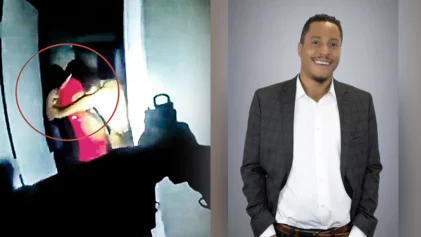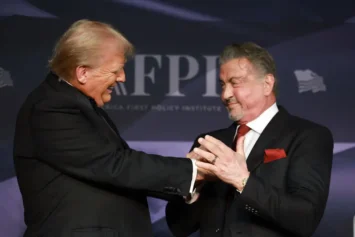State Rep. Sarah Anthony of Michigan arrived with extra protection on her way to the State Capitol Wednesday after armed protestors with nooses and Confederate regalia gathered in hordes inside of Lansing building last week.
The Democratic state representative, representing Lansing’s 68th House District, was escorted by at least two Black men and a Black woman who were armed with rifles as Anthony made her way to Capitol Avenue Wednesday morning.
The small group said their intentions were to exercise their Second Amendment rights by getting Anthony to her committee meetings without fear of intimidation. Anthony said she didn’t request the help but welcomed the group’s protection.
“We were all just appalled by the lack of support and lack of security that I had, that other legislators had, and the fact that a lot of the demonstrators last week were adorning many racist, anti-Semitic signage,” she told City Pulse. “I think it just triggered a lot of folks, especially African-Americans.”
Some who gathered for the April 30 protest had been decorated in flags, and others were legally armed with long guns. The group that gathered protested for state businesses to reopen on Friday, May 1 as lawmakers assembled to consider Gov. Gretchen Whitmer’s request to extend her emergency state-at-home mandate made in early April until May 15 amid the COVID-19 pandemic.
But the scene was much more quiet for Anthony as she arrived for the May 6 Appropriations Committee meeting. She had no trouble entering the state Capitol building and made it safely inside an elevator while escorted by the cadre of self-styled Second Amendment advocates, who would return to stand quietly at the Capitol’s front steps after Anthony was inside.
Michael Lynn Jr., a Black Lansing firefighter and community activist who helped organize Anthony’s security detail, said he suspected that cops would’ve been a bit more cautious — and perhaps violent — had his group been as boisterous as some of the crowds last week. His hoped that Wednesday’s escort changed the narrative to prove that Second Amendment rights aren’t limited on the basis of race.
“We want to change the narrative, first of all,” he said to the Lansing newspaper. “We want people to understand that people of color can come out here with guns just the same as anybody else can.”
Lynn felt compelled to form the small group after Anthony posted a Facebook video of herself watching from her office as the group of protestors crowded the Capitol grounds bearing Confederate flags, Nazi symbols, nooses and other forms of racist imagery.
“The majority of the protesters were white,” she said. “I’m still not exactly sure on the connection between Confederate flags and Nazi symbolism. They just had no connection to the stay-at-home orders. The fact they were carrying guns openly while we voted was unnerving.”
It was mainly unnerving because the Michigan State Police failed to maintain adequate security, she explained. Anthony only learned this week that police could have walked her to her car after she left the Capitol.
“It was just unnerving to me as a woman and as a person,” Anthony said, noting that Capitol sergeants otherwise do an adequate job keeping lawmakers inside safe. “These community volunteers today won’t be needed all the time, but they wanted to have a presence today.”
However, the long-standing practice of allowing open carry inside the Lansing state Capitol building is now under national scrutiny after last week’s demonstrations. The Michigan Capitol Commission is exploring whether guns should be banned inside the Capitol, according to the Detroit Free Press.
Such an action to ban non-law enforcement personnel from carrying guns into the statehouse after Black citizens tested the law would have a famous precedent. In1967, Black Panther Party members organized a much more dramatic such demonstration in California’s state Capitol in Sacramento.
“Two dozen armed Negroes entered the state Capitol at noon today and 10 made their way to the back of the Assembly Chamber before they were disarmed and marched away by the state police,” the Sacramento Bee newspaper wrote on May 2, 1967. The newspaper reported then that the Panthers would see their guns returned to them once they were outside the Capitol when police determined they had broken no laws by carrying their rifles openly and non-threateningly.
The Panthers had been protesting a recently introduced bill in the California Legislature that sought to ban citizens from openly carrying loaded guns in public places, a bill the media at the time dubbed the “Panther Bill,” as it was a reaction to the militant Black group’s practice of arming themselves to follow cops on “Panther Patrols.” The bill ultimately would become law.
Both Anthony and Lynn said they were vehemently opposed to allowing open carry inside the state’s Capitol.
“There are certain things that are just inappropriate,” Lynn said. “We don’t take guns in the courthouse. We don’t take guns into city hall. Why would we take guns of this caliber into the Capitol? I have 150 rounds on me right now. I could make terror. This could wreak havoc.”
It’s still unclear if the commission has the authority to restrict firearms inside the building or if it would mandate an adjustment to state law.
See video of the escort below.


